Inside the Pope’s Favourite Films
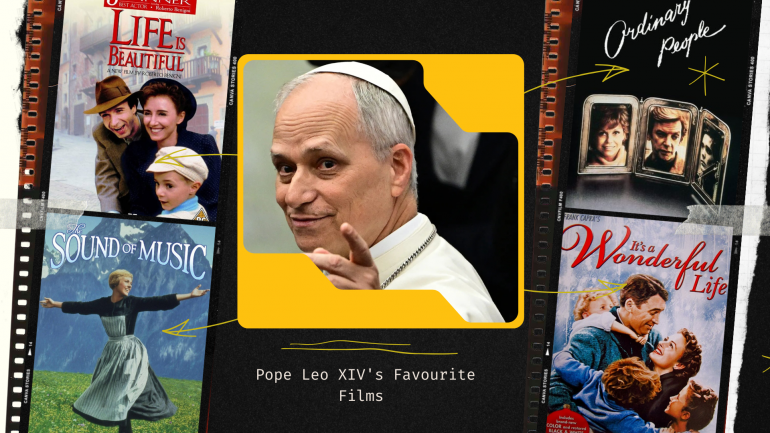
Last week, the Vatican revealed four films that hold personal significance for the Pope, describing them as “the most important in his cinematic journey.”
These include It’s a Wonderful Life (1946), The Sound of Music (1965), Ordinary People (1980), and Life Is Beautiful (1997). In these four short write-ups, the RVA writers present the plot of each movie in brief, highlighting their themes of love, compassion, and healing that helped make them the Pope’s favourites.
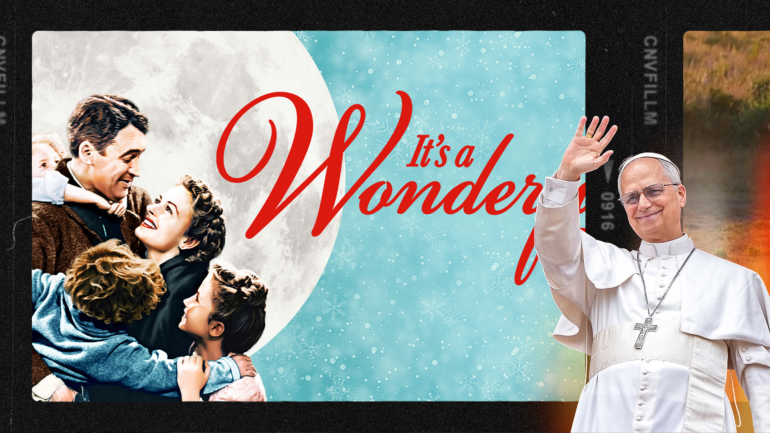
Building Heaven with a Bank Loan: It’s a wonderful life (1946)
By Joshua D’Souza, SJ
Frank Capra’s “It’s a Wonderful Life” tells the story of George Bailey, a man who trades his dreams of travel for the good of his small town. The film visually answers the hymn “Count Your Blessings.” George Bailey, despairing and unable to see his own value, is shown by the angel Clarence a world without him: the grim “Pottersville.” This revelation shows us how George's "failed" life is reframed as the "already" of God's kingdom at work. Clarence doesn’t show George heaven, but the grace already woven through his daily acts. George’s wonderful life was the one he had already lived, his blessings made visible in the love and resilience of the town he built.
The film’s truest grace shines not in the reunion, but in George’s desperate bridge prayer, answered not by thunder, but by a clumsy angel’s fall. God’s grace, it seems, prefers to arrive with gentle absurdity. When Zuzu says, “Every time a bell rings, an angel gets his wings,” we glimpse how small acts echo in eternity. George’s life reminds us that the Kingdom of Heaven is built not through grand success, but through quiet, inconvenient acts of love. So if you feel your life and dreams are stranded, take heart, you may already be doing God’s work.
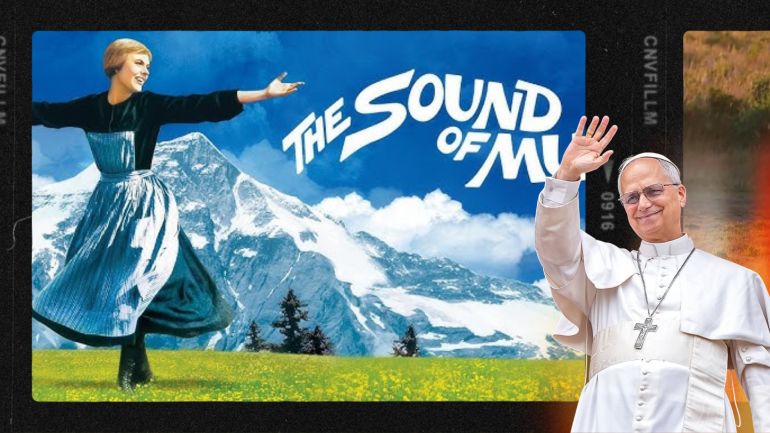
Power of Resistance: The Sound of Music (1965)
By Fr. Cedric Prakash SJ
In 1965, when "The Sound of Music" took the world by storm, I was in my teens and still in school. It was a blockbuster of a movie that will remain etched forever in my heart and memory. Sixty years after the movie was released, it is still as fresh as if I have just come out of the theatre after seeing it, the pulsating music keeps haunting, the immortal dialogues keep reverberating, the beautiful scenes keep flashing. No wonder the movie is on the list of Pope Leo XIV’s favourite four movies! Without hesitation, I say that it is my favourite movie too, because:
-
It is about family life: the way one needs to nurture and bring up children, not with rigid authoritarianism, but with love and warmth; with the ability to touch hidden potential that blossoms.
-
It is about resistance: the way Maria ‘rebels’ in the Abbey (she is ‘not an asset’) against a type of life that defies human feelings; the way the von Trapp family take a stand against the Nazi regime and escape to the safety of Switzerland after Austria was annexed.
-
It is about music: endearing, meaningful, soul-lifting, music that touches the core of one’s being and makes one sing too!
That is why "The Sound of Music" will forever be, as the song says, “a few of my favourite things!”
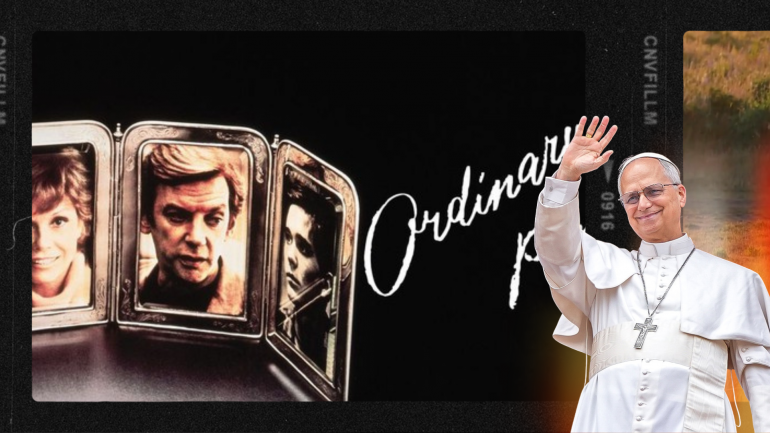
Confronting Our Wounds: Ordinary People (1980)
By Joseph Masilamany
"Ordinary People" (1980), one of Pope Leo’s favourite films, remains a timeless study of love, loss, and the quiet ache of being human. Directed by Robert Redford, the film portrays the Jarrett family, an outwardly perfect suburban household torn apart by tragedy. Beneath the calm veneer lies a web of guilt, silence, and emotional distance that slowly consumes them after the accidental death of their eldest son, Buck.
The surviving son, Conrad, is weighed down by guilt and depression, unable to forgive himself for surviving. His father, Calvin, seeks connection and understanding, while his mother, Beth, hides behind control and appearances. Their story unfolds not as melodrama, but as a mirror of the human heart struggling to reconcile love and pain, faith and despair.
It is easy to see why Pope Leo found meaning in this film. At its core, "Ordinary People" is not about tragedy, it is about grace. It speaks to the possibility of healing when we dare to confront our wounds, and the quiet redemption that comes through compassion and truth. In Conrad’s sessions with Dr. Berger, we witness a form of spiritual awakening, a journey from darkness into the light of forgiveness and self-acceptance.
Redford’s restrained direction allows silence to speak louder than words. Every pause, every strained glance, becomes a prayer for peace. The film reminds us that even in our most broken moments, God’s grace often comes through ordinary people, through patience, listening, and love that refuses to give up.
In the end, "Ordinary People" tells us that healing is not found in perfection, but in the courage to face our pain and begin again. And perhaps that is why it remains so deeply resonant - for popes and for all who seek the mercy of God in the messiness of human life.
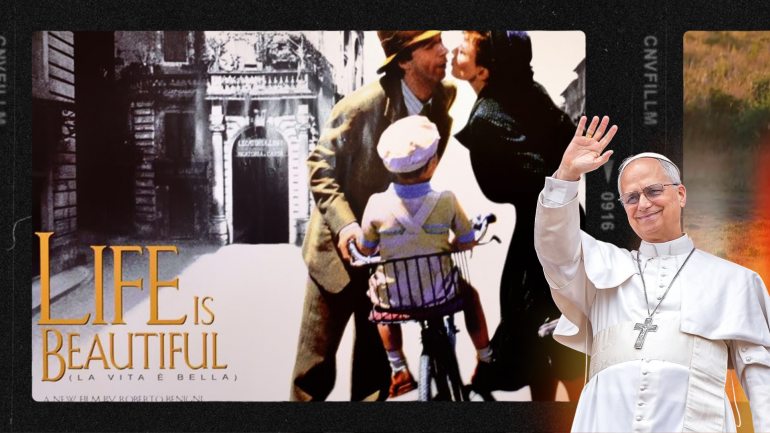
Love and Sacrifice: Life is Beautiful (1997)
By Fr. Sacaria Joseph, SJ
In Roberto Benigni’s 1997 film "Life is Beautiful," set in 1939 Italy, Guido Orefice, an imaginative Jewish-Italian man, arrives in a small Tuscan town and falls in love with Dora, a schoolteacher engaged to another man. Through warmth, wit, and optimism, Guido wins her heart. They marry and build a life of laughter and joy with their young son, Giosuè. Their world is shattered by the rise of fascism and World War II. Because of their Jewish identity, Guido and his uncle, Eliseo, are arrested and sent to a Nazi concentration camp. Giosuè is taken with them. In a profound act of love, Dora, a non-Jewish woman, chooses to board the train voluntarily, insisting on staying close to her family, though she is separated from them upon arrival.
Inside the camp, Guido uses all his courage and creativity to shield Giosuè from the surrounding horrors. He creates the fiction that the ordeal is a grand game: every task earns points, and the first to reach a thousand wins a real tank. Through humour, storytelling, and quick improvisation, he turns hunger into a challenge and terror into game rules, protecting his son’s innocence.
Guido hides Giosuè during roll calls, risks his life to send Dora a musical message, and keeps hope alive. As Allied forces approach, he seals Giosuè in a cabinet for the “final stage.” Captured soon after, Guido walks comically past his son to preserve the illusion before he is executed. The next morning, Giosuè emerges as American tanks arrive. Believing he has won, he rides out in triumph and is reunited with Dora. The film ends with his adult narration, a tribute to a father’s love that transformed horror into fragile joy and enduring hope.








